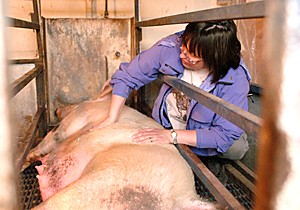The Arizonans for Humane Farming ballot initiative is finding little opposition at the UA, and volunteers said they are targeting the campus because most students are more sympathetic toward animal rights than older residents.
The initiative would mandate that commercial farms in Arizona gradually phase in a new method of farming in which pregnant sows, or female pigs, and veal calves would be required to have space to turn around, lie down and extend their limbs in their crates.
Members of the UA community are actively roaming the campus in an effort to obtain the estimated 170,000 to 200,000 signatures required by the end of this spring to allow Arizonans to vote on the proposition in November.
Volunteers said typically the UA campus is an effective, friendly place to get signatures.
Psychology graduate student Julie Cohen said she prefers to work the areas near the UA Mall, where student traffic and student interest seems to be high.
“”I would say about 90 to 95 percent of the people who stop (will) sign,”” Cohen said.
Cohen said she received relatively little opposition from students in addition to some positive feedback.
“”I think (signing) is a no-brainer,”” Cohen said. “”(Students are) like, ‘This is reasonable. I’ll sign this.’ It’s definitely something almost everyone can agree on.””
Jamie Massey, the Pima County Coordinator for Arizonans for Humane Farms, said he is confident about the initiative’s success, because he encountered much more opposition while gathering signatures to ban cock fighting in Arizona a few years ago, a proposition that passed with overwhelming favor.
Massey said although he sees room for improvement in student involvement, he feels students are becoming more receptive to animal rights issues.
“”(Attitudes) seem to be improving,”” Massey said. “”Kids seem to be really opening up, at least to animals, and I’m happy for that.””
Tiffany Goforth, a psychology senior and member of Students for the Ethical Treatment of Animals, said she got about 150 signatures at SETA’s “”meat-out”” day last week.
“”I think everybody’s for (humane farming,)”” Goforth said. “”I just don’t think people realize how meat gets from the farm to the plate.””
Judi Greil, an administrative associate in the Russian and Slavic studies department, said she has been obtaining signatures since last semester, primarily from members of her department and students who come into the department.
Greil said that of all the locations where she has collected signatures, the UA is the one she feels most comfortable in because younger people tend to empathize with animals.
Volunteers agreed that not every experience collecting signatures at UA was a good one.
Greil said she was “”disturbed”” when a student responded to her explanation of her cause by calling her a “”tree-hugger.””
“”It’s a very satisfying experience, but it’s also frustrating,”” Greil said.
Anyone who would like to get involved in the Humane Farming Initiative can contact Jamie@yesforhumanefarms.org.









